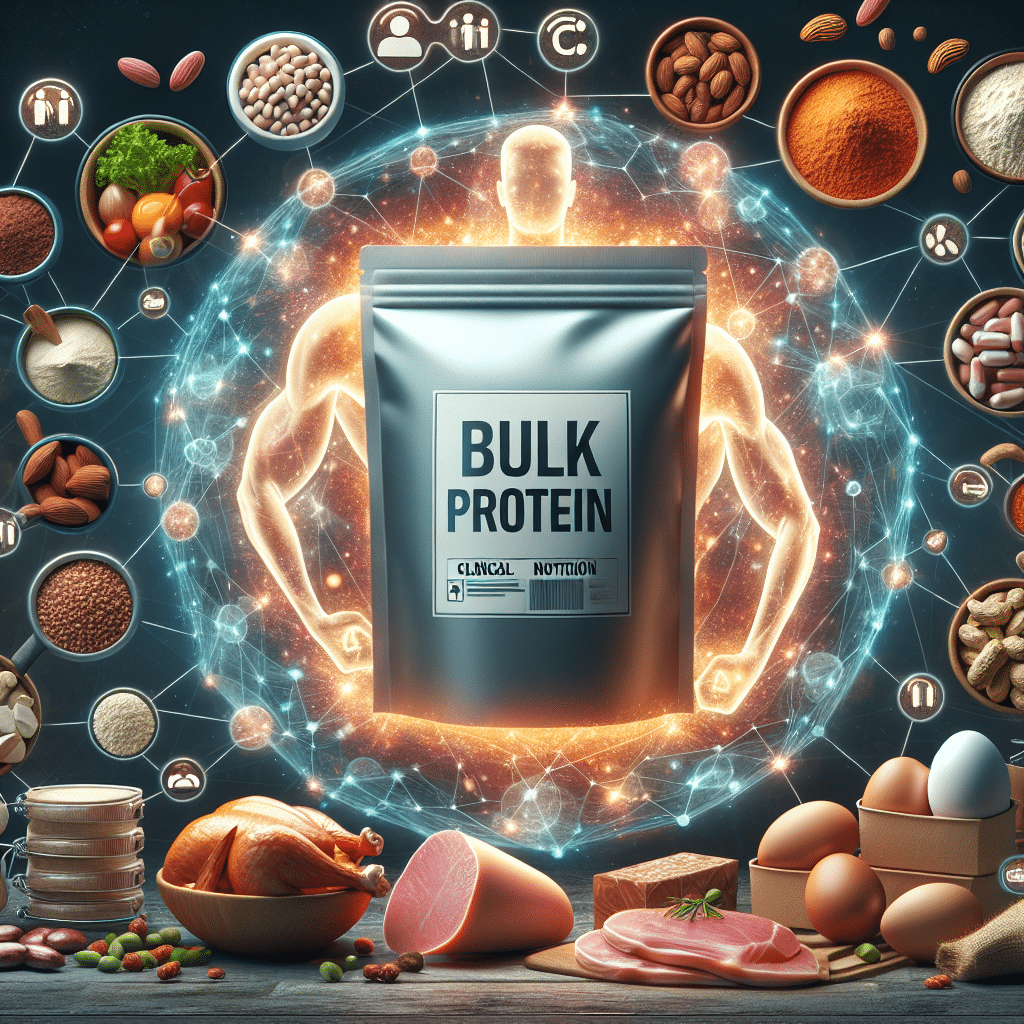Bulk Protein for Clinical Nutrition: Healing Power of Protein
-
Table of Contents
- Protein’s Healing Power in Clinical Nutrition: A Comprehensive Guide
- The Role of Protein in the Body’s Healing Process
- Understanding Clinical Nutrition and Its Importance
- Protein Requirements in Clinical Settings
- Benefits of Bulk Protein in Clinical Nutrition
- Case Studies and Research on Protein in Healing
- Choosing the Right Protein Supplement
- Conclusion: The Healing Power of Protein in Clinical Nutrition
- Discover ETprotein’s High-Quality Protein Products
Protein’s Healing Power in Clinical Nutrition: A Comprehensive Guide

Protein is a fundamental building block of life, essential for the growth, repair, and maintenance of all body tissues. Its role in clinical nutrition is particularly critical, as it aids in the healing process of patients recovering from illness, surgery, or trauma. Bulk protein supplements have become a cornerstone in the management of various health conditions, providing a concentrated source of this vital nutrient. This article delves into the importance of protein in clinical nutrition and the healing power it possesses.
The Role of Protein in the Body’s Healing Process
Protein plays a multifaceted role in the body’s healing process. It is involved in:
- Cell repair and regeneration
- Immune system function
- Production of enzymes and hormones
- Maintenance of muscle mass and strength
- Transportation of nutrients and oxygen in the blood
During periods of stress, such as illness or injury, the body’s demand for protein increases significantly. Adequate protein intake is crucial to support the heightened metabolic activity associated with healing and recovery.
Understanding Clinical Nutrition and Its Importance
Clinical nutrition involves the practice of analyzing if a person is consuming an adequate amount of nutrients for good health. A clinical nutritionist will consider various health needs, including caloric intake, nutrient balance, and the presence of any nutritional deficiencies or conditions that may require special dietary modifications.
In the context of clinical nutrition, protein is particularly important for patients who are:
- Recovering from surgery or trauma
- Dealing with severe burns or wounds
- Undergoing cancer treatment
- Experiencing malnutrition or muscle wasting diseases
- Struggling with conditions that impair nutrient absorption
Protein Requirements in Clinical Settings
The protein needs of individuals in clinical settings can vary widely based on their condition, age, weight, and overall health. The Recommended Dietary Allowance (RDA) for protein for healthy adults is 0.8 grams per kilogram of body weight per day. However, patients in clinical settings may require significantly more protein to facilitate healing. For example:
- Patients with burns may need 1.5 to 2.0 grams per kilogram of body weight
- Those recovering from surgery or trauma may require 1.2 to 1.5 grams per kilogram
- Individuals with severe infections or illnesses might need up to 2 grams per kilogram
It is essential to tailor protein intake to the specific needs of the patient to optimize recovery.
Benefits of Bulk Protein in Clinical Nutrition
Bulk protein supplements can offer several benefits in a clinical setting:
- Convenience: They provide an easy and efficient way to increase protein intake without significantly increasing food volume.
- Customization: Protein supplements can be tailored to meet individual dietary restrictions and preferences.
- Consistency: They ensure a consistent protein supply, which is crucial for patients with fluctuating appetites.
- Quality: High-quality protein supplements can deliver all essential amino acids necessary for recovery.
Case Studies and Research on Protein in Healing
Several studies have highlighted the importance of protein in the healing process. For instance:
- A study published in the Journal of Parenteral and Enteral Nutrition found that high-protein diets could improve wound healing rates in patients with acute or chronic wounds.
- Research in the American Journal of Clinical Nutrition showed that increased protein intake helped preserve muscle mass and function in elderly patients during periods of bed rest.
These studies underscore the critical role that protein plays in recovery and the potential benefits of protein supplementation in clinical nutrition.
Choosing the Right Protein Supplement
When selecting a protein supplement for clinical use, several factors should be considered:
- Type of Protein: Whey, casein, soy, and plant-based proteins each have different absorption rates and amino acid profiles.
- Digestibility: Some proteins may be easier to digest, which is important for patients with gastrointestinal issues.
- Amino Acid Composition: A complete amino acid profile is essential for optimal healing.
- Additional Nutrients: Some protein supplements also contain added vitamins and minerals that can support overall health.
It is important to work with a healthcare provider or a clinical nutritionist to choose the most appropriate protein supplement for a patient’s specific needs.
Conclusion: The Healing Power of Protein in Clinical Nutrition
Protein is a vital nutrient in the healing process, and its importance in clinical nutrition cannot be overstated. Adequate protein intake is essential for tissue repair, immune function, and overall recovery. Bulk protein supplements offer a practical solution to meet the increased protein demands of patients in clinical settings. By understanding the role of protein in healing and selecting the right protein supplement, healthcare providers can significantly improve patient outcomes.
Discover ETprotein’s High-Quality Protein Products
For those in need of bulk protein options for clinical nutrition, ETprotein offers a range of high-quality protein products. Their selection includes organic rice protein, clear rice protein, pea protein, clear pea protein, and various other plant-based proteins. These products are characterized by their neutral taste, non-GMO, and allergen-free attributes, making them suitable for a wide range of clinical applications.
ETprotein’s commitment to quality and their extensive product range make them an excellent choice for healthcare providers looking to incorporate protein supplements into their clinical nutrition plans. To explore their offerings and find the right protein solution for your needs, contact ETprotein today.
About ETprotein:
ETprotein, a reputable protein Chinese factory manufacturer and supplier, is renowned for producing, stocking, exporting, and delivering the highest quality organic bulk vegan protein and plant proteins. They include Organic rice protein, clear rice protein, pea protein, clear pea protein, pumpkin seed protein, sunflower seed protein, mung bean protein, peanut protein etc. Their offerings, characterized by a neutral taste, non-GMO, allergen-free attributes, cater to a diverse range of industries. They serve nutraceutical, pharmaceutical, cosmeceutical, veterinary, as well as food and beverage finished product distributors, traders, and manufacturers across Europe, USA, Canada, Australia, Thailand, Japan, Korea, Brazil, and Chile, among others.
ETprotein specialization includes exporting and delivering tailor-made protein powder and finished nutritional supplements. Their extensive product range covers sectors like Food and Beverage, Sports Nutrition, Weight Management, Dietary Supplements, Health and Wellness Products, and Infant Formula, ensuring comprehensive solutions to meet all your protein needs.
As a trusted company by leading global food and beverage brands and Fortune 500 companies, ETprotein reinforces China’s reputation in the global arena. For more information or to sample their products, please contact them and email sales(at)ETprotein.com today.














